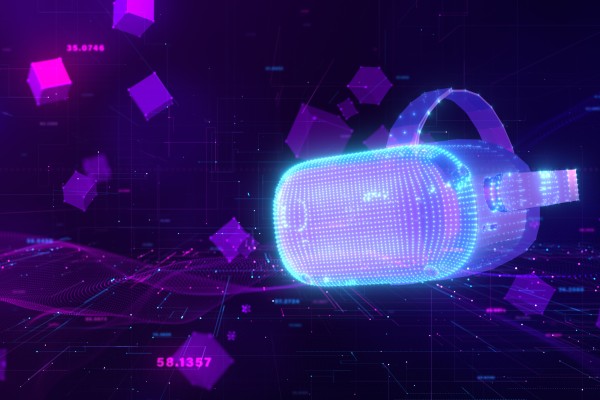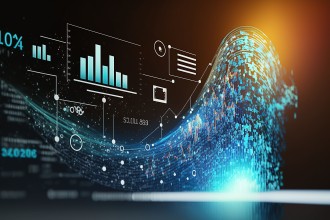What drives us to talk about ecommerce innovations? ensun aims to speed up global business progress through providing comprehensive information. Our web crawlers gather data, and our text-based algorithms organize it systematically. By combining our internal data with external sources, we offer insights into the latest technologies and spotlight the top innovators behind them.
For this report, we have analyzed about 4.633+ relevant companies within the ecommerce landscape.
Ecommerce, or electronic commerce, is fittingly described by Amazon as “the trading of goods and services on the internet. It is your bustling city center or brick-and-mortar shop translated into zeroes and ones on the internet superhighway.” Furthermore, DIGITALSILK describes ecommerce technologies as “a set of tools, platforms, and software solutions that enable online businesses to operate and conduct transactions over the Internet.”
With this understanding in mind, let’s dive into the latest trends shaping the ecommerce industry.
Forecasted Developments for Ecommerce
According to statistics, global ecommerce sales were estimated at 5.8 trillion U.S. dollars in 2023. This figure is projected to increase by about 39 percent, reaching over 8 trillion dollars by 2027. With global sales rising, competition intensifies. Therefore, businesses must focus on delivering more personalized and exceptional customer experiences to satisfy customers and keep them loyal.
Research reveals the growing importance of customer experience (CX) in today's market. According to Zippia, a staggering 74% of customers might buy a product just because they had a positive experience with the brand. Furthermore, 80% are more likely to purchase when companies offer personalized experiences tailored to their preferences. Zendesk mentions that 52% of customers would consider switching to a competitor after just one bad interaction, highlighting how many rides on a single moment of engagement. Forrester's findings reinforce this idea, showing that customers are 2.4 times more likely to stay loyal if a company resolves their issues quickly and 2.7 times more likely to spend more when the company's communication is clear. These insights emphasize that in the competitive ecommerce landscape, creating memorable and positive customer experiences is key to driving sales and ensuring customer loyalty.
But how can retail businesses implement a better customer experience?
To create a superior customer experience, retailers can combine several key elements. Using customer data for personalization helps businesses deliver tailored product recommendations and special offers. By adopting an omnichannel approach, companies ensure a seamless experience across online, mobile, and in-store platforms, keeping branding and product information consistent throughout.
Employees play a pivotal role in this puzzle. When staff are empowered to be knowledgeable and helpful, it leads to positive customer interactions. Adding convenience through easy returns and multiple payment options can further enhance the shopping experience. Incorporating customer feedback from surveys and social media allows businesses to identify and address areas for improvement. Technology also plays an important role; tools like chatbots and augmented reality can significantly elevate customer satisfaction.
Together, these pieces create a holistic approach to customer experience, where personalization, consistency, employee empowerment, convenience, feedback, and technology all work in harmony to attract and retain loyal customers.
Latest Ecommerce Technologies and Their Top Innovators
Now that the connection between the connection of economic growth and innovations resulting from it are established, what are some of these innovations? This paragraph aims to introduce several relevant topics gaining attention within the industry but not widely known publicly. At the same time, it will give recognition to leading companies in innovating each technological trend.
Let's examine some of the most promising technological directions receiving focused development currently within the ecommerce sector.
Ecommerce Software
Ecommerce software is the digital backbone of online stores. It handles everything from showcasing products and managing stock to securing payments and fulfilling orders. Imagine it as your virtual shop assistant, keeping track of everything behind the scenes.
Real-world examples abound. From the major online retailers, you know, to the local bakery with a delivery website, ecommerce software is at work. Even social media platforms can integrate ecommerce features, allowing you to buy directly from a seller's page. While it streamlines online sales, choosing the right software can be overwhelming, and some options require technical knowledge for setup and maintenance.
Top Innovators
- Narjis Infotech is a top innovator by delivering customized software and mobile app solutions that boost business growth and customer satisfaction.
- Vibe Internet Solutions specializes in delivering cutting-edge software and mobile solutions, focusing on customer behavior insights and collaborative product development.
- Xaipix is a leading custom software developer, creating tailored ERP, CRM, HRM, and mobile solutions that drive automation and digital transformation.
Last-Mile Ecommerce
Last-mile ecommerce refers to the final step in delivering online orders. It's the journey from a warehouse or distribution center directly to your doorstep. This short distance can be surprisingly complex, as logistics providers navigate traffic, parking limitations, and customer availability.
Many businesses rely on last-mile delivery. From fashion retailers getting you that new dress to grocery stores bringing fresh produce to your kitchen, and even furniture stores coordinating the arrival of a new couch, efficient last-mile delivery keeps ecommerce running smoothly. While it offers convenience for customers and can be expensive for businesses, new technologies like self-driving vehicles and delivery drones are being explored to improve efficiency and potentially bring down costs.
Top Innovators
- Logicare is a leading 3PL provider offering customized, sustainable logistics and supply chain solutions, with a focus on advanced technology and operational efficiency.
- ProConnect Integrated Logistics, backed by Redington's rich history, delivers comprehensive supply chain solutions, emphasizing simplicity, trust, and openness in its approach.
- OnTrac Shipping offers efficient last-mile logistics solutions with shorter transit times, lower costs, and a diverse, customer-focused approach, reaching over 65 million consumers since 2008.
Metaverse
The metaverse is a virtual space where users can interact with each other and digital environments in real-time. It combines technologies like virtual reality (VR), augmented reality (AR), and online gaming to create immersive experiences. More precisely, users can socialize, play games, shop, attend events, and even work within a 3D digital landscape.
As a concept, this is gaining significance in various industries, including entertainment, gaming, and business. It has the potential to revolutionize how people connect and collaborate, offering new opportunities for virtual commerce, education, and remote work. However, challenges include privacy concerns, data security, and equitable access to technology. Prominent examples of the metaverse include platforms like Meta's Horizon Workrooms for virtual meetings, Decentraland for virtual real estate, and Roblox for user-generated gaming experiences.
Top Innovators
- TILTLABS leads in innovative solutions by creating immersive experiences through Metaverse, XR, and virtual production.
- MetaMix Tech is a Mixed Reality company focused on delivering enterprise and consumer XR/MR solutions, blending physical and digital worlds for a seamless and immersive experience.
- TurnkeyTown specializes in blockchain development, offering advanced virtual reality solutions and NFT marketplace creation, with a diverse team across development, sales, content, and marketing.
Voice Search
Voice search technology enables users to interact with devices by speaking instead of typing, facilitating a more accessible shopping experience. NLP helps voice-enabled devices like smart speakers and virtual assistants to accurately interpret spoken language and generate relevant responses. In ecommerce, this technology offers a convenient, hands-free way to browse and purchase products. While voice search can face challenges like speech recognition errors and privacy concerns, the seamless experience it provides often outweighs these issues for users.
Top Innovators
- Slang Labs is a dedicated team building CONVA, a platform for category-specific voice Copilots, aimed at making apps faster, easier, and more accessible.
- Constructor.io is a leading AI-driven ecommerce search engine, using advanced natural language processing, machine learning, and collaborative personalization to optimize product discovery for major retail brands.
Navigating Technological Evolution
In summary, ecommerce is entering a dynamic phase, with sales projected to exceed $8 trillion by 2027. As customer experience becomes central, businesses must focus on personalization and seamless engagement. Technologies like ecommerce software, the metaverse, and voice search are driving innovation in the industry. By embracing these trends, companies can stay ahead in the competitive ecommerce landscape.
But transportation technology is not the only field evolving. Our B2B search engine unveils you suppliers for the exact technology you are looking for – globally and inter-industrial.
Start searching here now.
FAQ about Ecommerce Technologies
The foundation of any thriving online store rests on four pillars. First, a compelling product selection with clear descriptions is key. Next, secure and diverse payment options build customer trust. Efficient logistics ensure products reach buyers quickly and smoothly. Finally, strategic marketing attracts customers and keeps them coming back.
Business-to-Consumer (B2C): This is the classic online shopping experience, where businesses sell directly to individual consumers. (think Amazon, clothing stores)
Business-to-Business (B2B): Businesses sell products or services to other businesses, often in larger quantities and with more complex transactions. (think office supply companies)
Consumer-to-Consumer (C2C): Individuals sell directly to other consumers, typically on platforms that facilitate the transaction. (think eBay, used clothing marketplaces)
Consumer-to-Business (C2B): Consumers offer their skills or services to businesses, sometimes through online platforms. (think freelance marketplaces, graphic design services)
Business-to-Administration (B2A): Businesses interact with government agencies electronically, for tasks like permit applications or tax filing.
HTTPS (with encryption like TLS) is the lock on your e-commerce door. It scrambles data, protecting your info. But security goes deeper. Firewalls guard against intruders, payment processors handle transactions securely, and extra steps like tokenization and multifactor authentication add layers of defense.
E-commerce focuses specifically on online buying and selling of goods and services. It's like the online store within your whole business. For example, buying shoes online.
E-business encompasses all the ways a business operates online, including e-commerce, but also things like online marketing, customer service, and even internal communication. So overall, everything a company does online.
Quickscout
Auf der Suche nach
passenden Lieferanten?
Beginne jetzt mit unserer KI-basierten Lieferantensuche!





